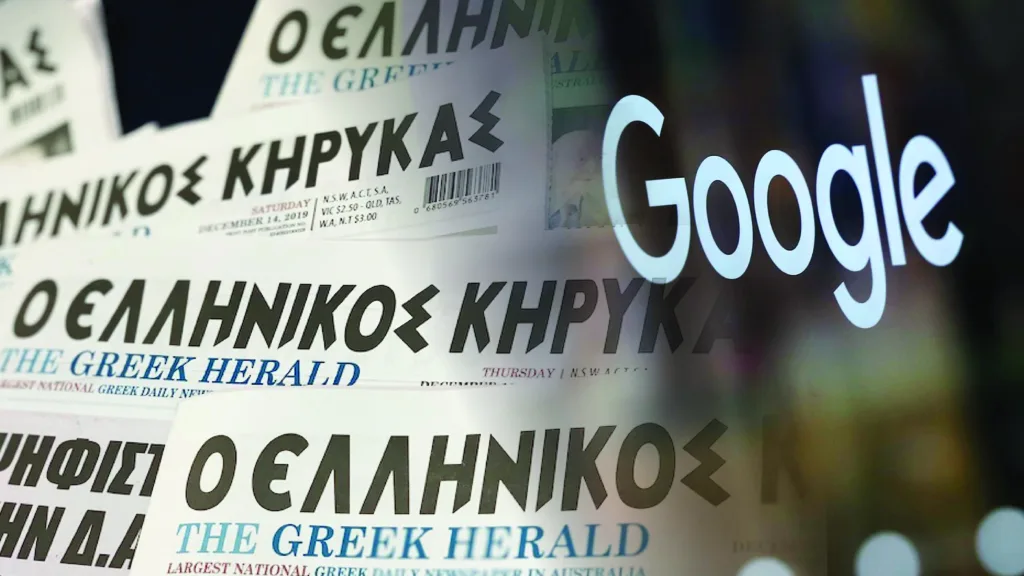The future of multicultural and independent media in Australia is under renewed threat after tech giant Google announced it would withdraw from a key funding agreement two years ahead of schedule — a move that has drawn sharp criticism from both publishers and the federal Opposition.
The deal, brokered in 2022 by the Minderoo Foundation under the Public Interest Publishers Alliance (PIPA), had provided crucial support to over 20 smaller outlets, including The Greek Herald, Indian Link, The Australian Jewish News, and Star Observer. It was originally intended to run until 2027 but will now end by July 2025.
In a letter to participating media outlets, Google cited a need to simplify its support model and “reduce the administrative burden on participants,” signalling a shift to a centralised distribution method via a third-party provider.
“Feedback received from publishers indicates that the program required significant team resources to complete required submissions, reports and financial processes,” a Google spokesperson stated.
“In line with this change to a centralised distribution model we will be discontinuing individual publisher agreements negotiated through the Minderoo Foundation.”

Publishers say they planned budgets and operations around a long-term agreement and now face significant financial uncertainty.
Dimitra Skalkos, Publisher of The Greek Herald, criticised Google’s decision.
“This decision by Google to prematurely terminate its agreement places significant strain on independent publishers like The Greek Herald, who have planned and forecasted on the basis of the original five-year commitment,” Ms Skalkos said.
“This is more than just a funding cut — it’s a profound step backwards for media equity in Australia.”
Ms Skalkos added that The Greek Herald remains hopeful Minderoo can reopen negotiations with Google, but also called for immediate federal intervention.
“We urge the Albanese Government to respond with urgency and demonstrate that it values a media landscape that includes all voices — not just the dominant ones. Without real and enforceable support, we risk losing the very platforms that hold our communities together, especially in times of crisis, change, and cultural significance,” she said.

The Federal Government had introduced the News Media Bargaining Code in 2021 to ensure tech platforms fairly compensated media organisations. However, progress on Labor’s proposed “news bargaining incentive” — which would pressure platforms to renew or enter new deals — has stalled, with no policy paper released to date.
Both Meta and Google entered into deals with publishers to avoid designation under the code, with more than $600 million distributed across the media sector over three years.
While some of Google’s deals were structured as three- or five-year agreements, others became rolling one-year contracts, making them more vulnerable to withdrawal.
Now, Shadow Minister for Communications Melissa McIntosh MP has condemned the government’s failure to secure ongoing support for Australia’s diverse media landscape.
“The Albanese Labor Government’s inability to get the News Media Bargaining Code renewals with tech giants over the line for more than a year will cause additional publications to lose millions of dollars and potentially see them close,” Ms McIntosh said.
“The Code was meant to be world-leading competition policy; however, it is caught in the US tariff dispute and Labor’s slow approach is harming Australian media outlets.”
She called for greater accountability from Google and urgent action from the federal government to protect publishers left in limbo.
“It is right to question why Google is not continuing its contract with Public Interest Publishers Alliance publications through till its completion at the end of 2027. These publications were relying on the contracted funding to maintain quality journalism and staff,” Ms McIntosh said.
“Australia needs to continue to have quality local and interest-based publications to tell the stories of multicultural communities, businesses and regions.”
With Meta already refusing to renew several existing content agreements, the early cancellation by Google has raised alarms about the long-term viability of the smaller, independent media outlets that serve as vital sources of news and cultural connection across Australia.
